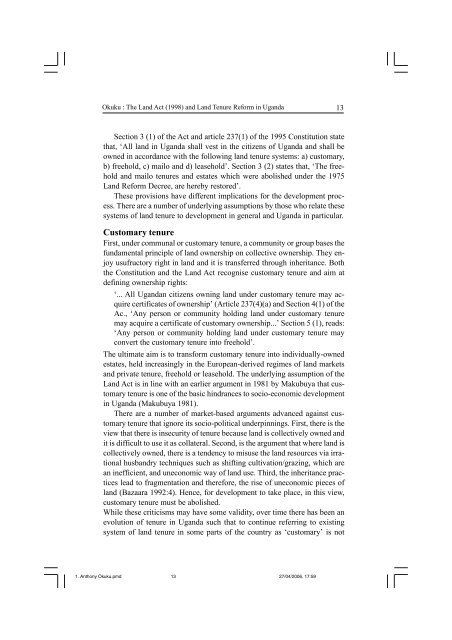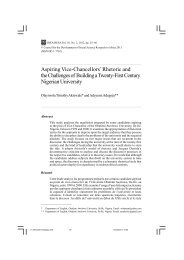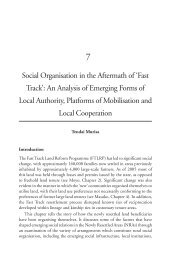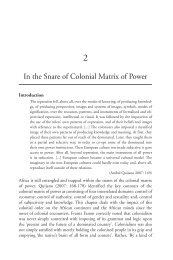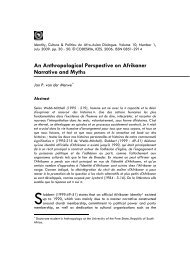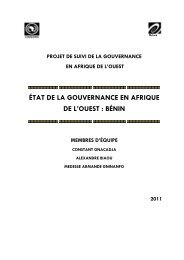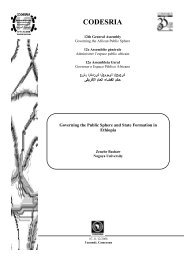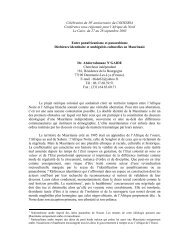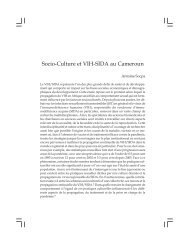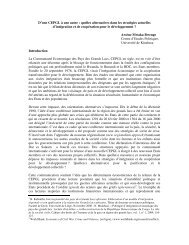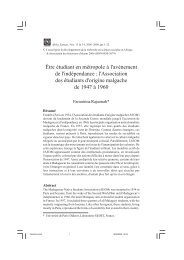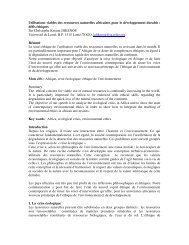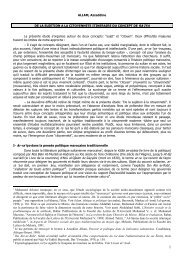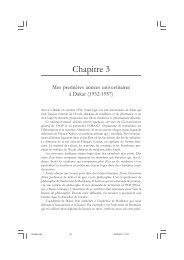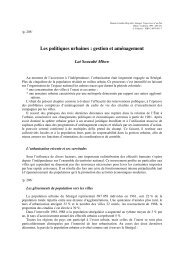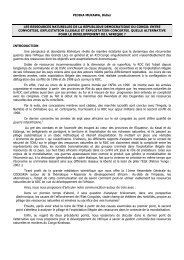and Land Tenure Reform in Uganda - codesria
and Land Tenure Reform in Uganda - codesria
and Land Tenure Reform in Uganda - codesria
Create successful ePaper yourself
Turn your PDF publications into a flip-book with our unique Google optimized e-Paper software.
Okuku : The L<strong>and</strong> Act (1998) <strong>and</strong> L<strong>and</strong> <strong>Tenure</strong> <strong>Reform</strong> <strong>in</strong> Ug<strong>and</strong>a<br />
Section 3 (1) of the Act <strong>and</strong> article 237(1) of the 1995 Constitution state<br />
that, ‘All l<strong>and</strong> <strong>in</strong> Ug<strong>and</strong>a shall vest <strong>in</strong> the citizens of Ug<strong>and</strong>a <strong>and</strong> shall be<br />
owned <strong>in</strong> accordance with the follow<strong>in</strong>g l<strong>and</strong> tenure systems: a) customary,<br />
b) freehold, c) mailo <strong>and</strong> d) leasehold’. Section 3 (2) states that, ‘The freehold<br />
<strong>and</strong> mailo tenures <strong>and</strong> estates which were abolished under the 1975<br />
L<strong>and</strong> <strong>Reform</strong> Decree, are hereby restored’.<br />
These provisions have different implications for the development process.<br />
There are a number of underly<strong>in</strong>g assumptions by those who relate these<br />
systems of l<strong>and</strong> tenure to development <strong>in</strong> general <strong>and</strong> Ug<strong>and</strong>a <strong>in</strong> particular.<br />
Customary tenure<br />
First, under communal or customary tenure, a community or group bases the<br />
fundamental pr<strong>in</strong>ciple of l<strong>and</strong> ownership on collective ownership. They enjoy<br />
usufructory right <strong>in</strong> l<strong>and</strong> <strong>and</strong> it is transferred through <strong>in</strong>heritance. Both<br />
the Constitution <strong>and</strong> the L<strong>and</strong> Act recognise customary tenure <strong>and</strong> aim at<br />
def<strong>in</strong><strong>in</strong>g ownership rights:<br />
‘... All Ug<strong>and</strong>an citizens own<strong>in</strong>g l<strong>and</strong> under customary tenure may acquire<br />
certificates of ownership’ (Article 237(4)(a) <strong>and</strong> Section 4(1) of the<br />
Ac., ‘Any person or community hold<strong>in</strong>g l<strong>and</strong> under customary tenure<br />
may acquire a certificate of customary ownership...’ Section 5 (1), reads:<br />
‘Any person or community hold<strong>in</strong>g l<strong>and</strong> under customary tenure may<br />
convert the customary tenure <strong>in</strong>to freehold’.<br />
The ultimate aim is to transform customary tenure <strong>in</strong>to <strong>in</strong>dividually-owned<br />
estates, held <strong>in</strong>creas<strong>in</strong>gly <strong>in</strong> the European-derived regimes of l<strong>and</strong> markets<br />
<strong>and</strong> private tenure, freehold or leasehold. The underly<strong>in</strong>g assumption of the<br />
L<strong>and</strong> Act is <strong>in</strong> l<strong>in</strong>e with an earlier argument <strong>in</strong> 1981 by Makubuya that customary<br />
tenure is one of the basic h<strong>in</strong>drances to socio-economic development<br />
<strong>in</strong> Ug<strong>and</strong>a (Makubuya 1981).<br />
There are a number of market-based arguments advanced aga<strong>in</strong>st customary<br />
tenure that ignore its socio-political underp<strong>in</strong>n<strong>in</strong>gs. First, there is the<br />
view that there is <strong>in</strong>security of tenure because l<strong>and</strong> is collectively owned <strong>and</strong><br />
it is difficult to use it as collateral. Second, is the argument that where l<strong>and</strong> is<br />
collectively owned, there is a tendency to misuse the l<strong>and</strong> resources via irrational<br />
husb<strong>and</strong>ry techniques such as shift<strong>in</strong>g cultivation/graz<strong>in</strong>g, which are<br />
an <strong>in</strong>efficient, <strong>and</strong> uneconomic way of l<strong>and</strong> use. Third, the <strong>in</strong>heritance practices<br />
lead to fragmentation <strong>and</strong> therefore, the rise of uneconomic pieces of<br />
l<strong>and</strong> (Bazaara 1992:4). Hence, for development to take place, <strong>in</strong> this view,<br />
customary tenure must be abolished.<br />
While these criticisms may have some validity, over time there has been an<br />
evolution of tenure <strong>in</strong> Ug<strong>and</strong>a such that to cont<strong>in</strong>ue referr<strong>in</strong>g to exist<strong>in</strong>g<br />
system of l<strong>and</strong> tenure <strong>in</strong> some parts of the country as ‘customary’ is not<br />
1. Anthony Okuku.pmd 13<br />
27/04/2006, 17:59<br />
13


